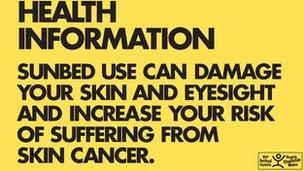Banned sunbeds: 'No redeeming features', says top medic
- Published
Unmanned sunbeds have "no redeeming features", says Wales' chief medical officer.
Dr Tony Jewell spoke as the facilities are being banned in Wales as laws to clamp down on sunbed use are extended.
From Monday, businesses with unmanned coin-operated sunbeds could be fined £5,000.
"Suntan is a sign you've had exposure to ultra-violet light and that increases the risk of skin cancer," said Dr Jewell.
Under-18s were forbidden from using sunbeds in April across Wales and England to try to reduce skin cancer.
When that ban was introduced by the UK government, there was nothing to stop under-18s using an unsupervised salon.
Now the Welsh government is aiming to ensure young people will not have access to any sunbeds.
Midday sun levels
Local authorities could fine businesses up to £20,000 if an under-18 is caught using a sunbed.
Dr Jewell told BBC Radio Wales: "I don't think there are any redeeming features to sunbed use in salons like this and we do want to reduce their use.
"Sunbeds give you Mediterranean midday sun levels of UV light and the problem is UV is radiation and sunburn is a sign your skin has been burned by radiation, so it's not a good thing.
"We don't think it's a good thing to do. It damages eyes and it ages skin."
Asked whether an outright ban on sunbeds was likely, Dr Jewell replied: "We'll wait and see.
"This is about adult choices and the ban is for under-18-year-olds and we hope adults will make an informed choice."
Abuse of a sunbed
Gary Lipman of the Sunbeds Association said it "mostly" welcomed the Welsh government's initiative because he said it was based on code of practice introduced by the association in 1995.
"Our members have been operating to the code of practice and even non-members have worked to the code of practice as well," he said.
He added: "That's not to say that the use of a sunbed is harmful - it's the abuse of a sunbed that can be harmful and that's what we have got to eradicate.
"We are attracted to ultra-violet because naturally we need the sun for vitamin D. There's no difference between a sunbed and the natural sun."
Councils say they will help salons to ensure they comply with the ban, which has been welcomed by cancer charities.
Welsh cancer charity Tenovus said the ban was important as skin cancer is the most common cause of cancer in 15 to 24-year-olds, and south Wales has one of the highest incidences in the UK.
"Skin cancer incidence is very strongly linked to over-exposure to ultra-violet radiation through sunbeds, levels of which can be six times stronger than the Australian midday sun," said Tenovus head of research Dr Ian Lewis.
"Wales alone has 500 cases of malignant melanoma a year, the most dangerous and potentially fatal form of skin cancer, resulting in 100 deaths.
"The rise in incidence of this type of skin cancer is truly alarming; between 1996 and 2006, Wales saw the rate of malignant melanoma, in men and women double."
First degree burns
The new legislation comes after two cases were highlighted in the media in recent years.

Kirsty McRae, then 14, was treated for first degree burns after spending 19 minutes on a sunbed at an unmanned salon in Barry, Vale of Glamorgan.
Ten-year-old Kelly Thompson, from Port Talbot, received 70% burns after spending 16 minutes on an unsupervised sunbed.
The Welsh government legislation also bans the sale or hire of sunbeds to under-18s, while making it an offence not to provide protective eyewear to those using them.
Health Minister Lesley Griffiths said tanning businesses would also be given posters to display showing the risks of sunbed use.
"There is no doubt among health experts that using sunbeds can be very harmful," she said. "They have been linked to a higher risk of skin cancer, eye damage, and premature skin ageing.
"Melanoma is a skin cancer that develops in young people and sunburn is a risk factor for melanoma."
Enforcing the law
Cancer Research Wales said using a sunbed before the age of 35 increased by 75% the risk of malignant melanoma, the most dangerous form of skin cancer.
"We know that young people across Wales, particularly teenage girls, have used sunbeds in large numbers which is why Cancer Research UK helped campaign for the recent legislation to make it illegal for under-18s to use sunbeds," said Sarah Woolnough, the charity's director of policy.
"We believe these new supporting measures introduced by the Welsh Government will make the legislation as effective as possible and help save lives."
Narrow powers
Councils will now have to enforce the law, with some saying they want to help salons bring in the changes.
Philip Evans, of Conwy council, said: "Adopting a close working relationship with sunbed operators across both counties at an early stage, should ensure that we play a significant role in achieving this important public health outcome."
Under-18s in Scotland were banned from using sunbeds in 2009 though no final decisions have been made yet as to whether the same law will be passed in England.
A private members bill passed through the Commons and Lords last year gave narrow powers to ministers across the UK to make certain regulations relating to the use of sunbeds by under-18s and to ban unmanned tanning salons.
The bill did not give ministers any powers to ban sunbeds or tanning salons altogether.
- Published8 April 2011